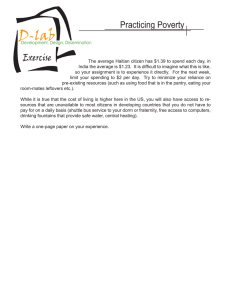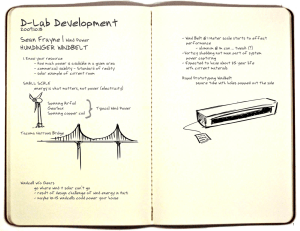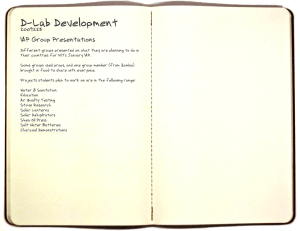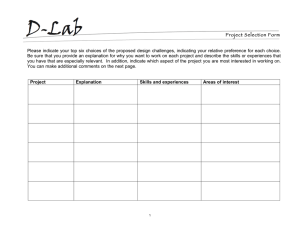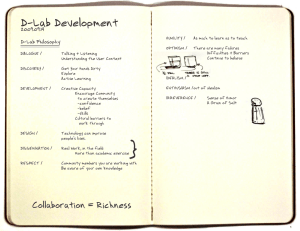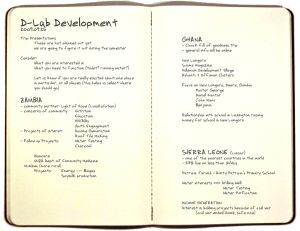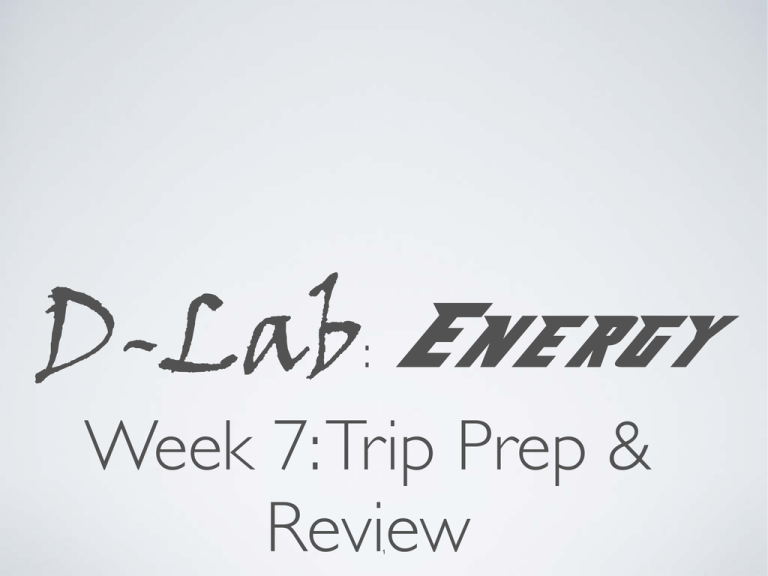
D-Lab: Energy
Week 7: Trip Prep &
Review
1
AGENDA
•
Presentations
•
Quick Review/Catch-up
•
•
•
Solar Cookers
•
energy to boil water
Trip Prep
•
getting good information
•
what would you do?
Muddy Card
2
SOLAR COOKERS
concentrator
(parabolic)
box
(greenhouse)
© source unknown. All rights reserved. This content is excluded from our Creative
Commons license. For more information, see http://ocw.mit.edu/fairuse.
combination
(panel)
Public domain image (Source: Wikipedia, by Tom Sponheim).
3
TRIP GOALS
• have well-identified, well-understood, well-documented
projects, at least a few highly relevant to D-lab Energy and if
available others for other D-lab classes in the future
• really understand the communities – needs, finances, health,
education, culture, government structure, formal and informal
leaders, lifestyles, work, etc.
• charcoal trainings / creative capacity building
4
Refugee Camp in Pader, Uganda
5
Technology demonstration in Amokolegwai
6
The hand corn sheller
7
Making corn shellers
8
Traditional grinding stones: a better way?
9
A commercial grinder
10
Making a pedal powered grinder
11
The pedal-powered grinder
12
13
14
15
Advantages
• Efficiency
• Effectiveness
• Self-Reliance
• Sustainability
16
Disadvantages of Participation
• Time
• Resources
– Materials
– Human
• Unpredictability
• Expectation management
17
Consultation vs Co-Creation
Community Involvement
Problem
Idea Generation
Solution
Community Involvement
Community
Involvement
Concept Evaluation
Testing & Evaluatio
Fabrication
Detail Design
18
GETTING GOOD
INFORMATION
Barriers:
• language
• translator issues
• educational backgrounds
• cultural backgrounds
• telling you want you “want”
to hear
• wrong person
19
Methods:
• ask question different ways,
multiple times
• ask multiple people
• demonstrate openness to
criticism
• repeat answers back
• encourage questions
• verify expertise
• discuss goals/preferences
with translator
GET TO THE CORE PROBLEM
• project
specifications
• observable/analyzable
• quantifiable
• document WHAT
not HOW
20
GET TO THE CORE PROBLEM
Questions
• tell
me what would happen (story)
• how
[big] is too [big]; how [small] is too [small]
• challenge
requests (what if? what would happen if?)
• feedback
on ideas, including known problematic ones
Take time to review knowledge; mental design process
21
PACKING LIST - MUST HAVES
• Not
much needs to be bought new
• Pack
lightly
• 50°F
at night - as 100°F at day
• Conservative
dress
• Toiletries: meds
• Towel
• Bug
(2x), toilet paper or tissues, others you need
(small)
repellant & sunscreen
• Flashlight
• photocopy
• notebook
• nothing
of passport
& waterproof pens/pencils
of value (jewelry, cameras, laptops, etc.)
22
GIFTS
23
MONEY
• charlie
• $10
card
for entry visa
• cash: $20
• call
bills or smaller, in good condition
bank/credit card companies to warn of travel
• US$50
probably sufficient (food (mostly pre-paid), gifts)
24
TRIP TIPS
• assume
drinking water is unsafe (& therefore uncooked fruits/
• nothing
expensive in sight (or, ideally, brought)
veggies)
• travel
in groups, especially at night
• flexibility
• manage
and patience are key
expectations with community partners
25
FORMS/CHECKS!
• D-Lab
• MIT
Emergency Contact Form
Student Travel Form
• $500
check made out to D-Lab
• Photocopy
• If
of passport
you don’t have all today, make plan with Amy
26
REMAINDER OF CLASS
• Micro-interviews
• Revise
plan based on feedback from presentations
• Packing
• What
class
– how much checked luggage
do you need from D-Lab: email list to Amy by end of
• tools
• cameras
• mosquito
nets
• hammocks
• other?
• do
not leave unless interview is complete (or it’s 3)
27
MIT OpenCourseWare
http://ocw.mit.edu
EC.711 D-Lab: Energy
Spring 2011
For information about citing these materials or our Terms of Use, visit: http://ocw.mit.edu/terms.

